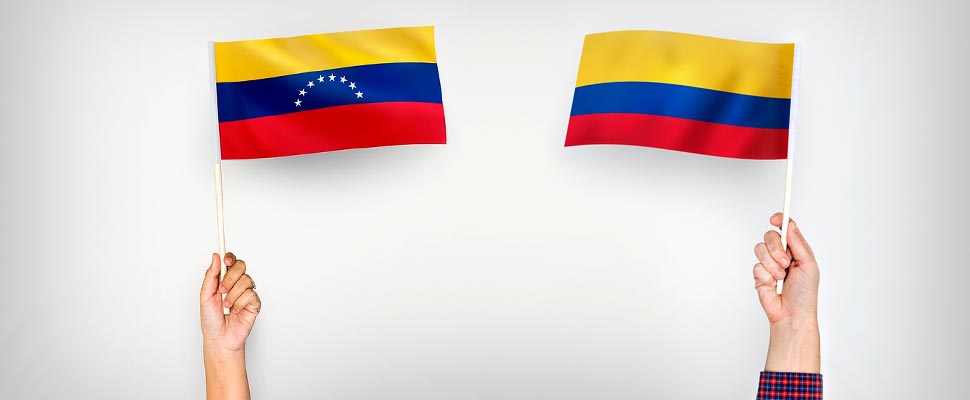The normalization of binational relations could bring benefits for both countries.

Since the government of Iván Duque took over as president of Colombia, almost 3 years ago, Colombia took a much tougher position against the Venezuelan regime. Photo: LatinAmerican Post
LatinAmerican Post | Santiago Gómez Hernández
Listen to this article
Leer en español: Opinión: 5 motivos por los que Colombia y Venezuela deben restaurar relaciones
Since the government of Iván Duque in Colombia, almost 3 years ago, the country took a much tougher position against the Venezuelan regime. So much so that from the beginning, Duque promised to denounce Maduro before the International Court.
The so-called diplomatic siege that Duque wanted to implement eventually brought together several other countries with the same purpose: Colombia, Peru, Argentina, Chile, Brazil, the United States, the European Union, among others. This has left the Venezuelan regime in a rather difficult position. However, there were still oxygen tanks thanks to the support of powers such as Russia, China, Iran, and Turkey. Now that the political landscape in Latin America has turned to the left and with worn-out relations, it is time to open resume conversations with Venezuela. These are several reasons why this is a good time to re-establish diplomatic relations.
Internal dialogue
Already the opposition leader Juan Guaidó and Nicolás Maduro have advanced approaches to initiate a dialogue between both sectors. Without a clear future success, but with intentions (apparently genuine of both) this umpteenth dialogue could perhaps be beneficial for both.
Nicolás Maduro aceptó reunirse con Juan Guaidó luego de que el líder opositor propusiera una negociación que podría incluir el levantamiento de las sanciones para el chavismo.
Aseguró que aceptará el dialogo con mediación internacional #VocesySonidos
— BluRadio Colombia (@BluRadioCo) May 12, 2021
Reestablishing democracy would give the Venezuelan government legitimacy for the international community to accept normalizing its relations. A genuine commitment in the future to end the dictatorship would be the perfect excuse for Iván Duque to be able to relax his speech and try to get closer.
Safety
The main benefit for both countries is in terms of security. Today, the two nations face difficult security problems, both from organized crime and from armed organizations. The fighting in the Apure and Arauca region between Venezuelan Armed Forces and various Colombian armed groups has put Venezuela in check.
Faced with an apparent defeat, the Venezuelan army has shown inefficiency in safeguarding security. Ironically, the presence of illegal groups and Colombian drug traffickers in the Venezuelan border has always had the implicit approval, of the Venezuelan Government. However, things have changed and today Venezuela is the main victim.
#15May Fe de vida de los ocho soldados venezolanos secuestrados por las disidencias de las FARC en el estado Apure.
Para ampliar esta información: https://t.co/pR5I8lcIx8 pic.twitter.com/zieGatnRWb
— NTN24 Venezuela (@NTN24ve) May 15, 2021
If Maduro commits to military cooperation with the Colombian government against any kind of military group, this could be beneficial for both countries and border residents. This implies that historical allies of Chavismo, such as the FARC dissidents, lose their main ally. This can only be achieved with strong binational relations and a commitment to guarantee the rule of law in both countries.
Economy
With strong binational relations, and with a respect for companies and foreign capital, this could be the main way to improve the economy of both nations. Now that we visualize a post-pandemic panorama, what could be better than to have a Colombian-Venezuelan market?. This would not only guarantee the possibility of investing in Venezuela, helping the battered Caribbean economy, but it is also a great opportunity for both countries.
Change in the regional political trend
Duque and Colombia have been some of Venezuela's main diplomatic adversaries. But the continent is turning to the left again (or at least to the center). And in the absence of results from the "diplomatic siege", it will very likely be left alone on this side of the Atlantic.
The United States, under the new administration, is quite possibly also interested in achieving better results with a strategy other than sanctions and diplomatic pressure.
Migration
In addition to the fact that if the Venezuelan economy improves, the migration crisis will also be reduced, the fact of establishing diplomatic ties may improve the reception and procedures of migrants. By having better relationships, the migrant is the one who benefits the most. Colombia will be able to have a better registry of migrants and improve the way in which it will be able to receive and support them (with international aid). All this, within a post-pandemic context where both countries will have different levels and speeds of vaccination and reopening, for which it is necessary to cooperate.
Also read: A turn to the right: This is Guillermo Lasso's plan for Ecuador
Main obstacles
The most difficult challenges to meet are in policy and internal calculations. Both Chavismo and Uribismo (the two official movements) have been sustained largely by the existence of the other. So much so that a rapprochement with the other country, without the support of its political bases, would mean the rejection of national support. For Venezuela, it is a little easier, in a totalitarian government and without real elections. While Colombia will have parliamentary and presidential elections next year.
Another reason that hinders the normalization of relationships is that so much negative rhetoric has been accumulating over the years. Both governments have been in a discursive war and this will make peace difficult. There are serious accusations on both sides: that Venezuela is allied with Colombian guerrillas and negotiates drug shipments with Colombian drug traffickers; and that Colombia is the main regional axis to destabilize the Chavista regime, serving as a base and support for a "coup d'état."





